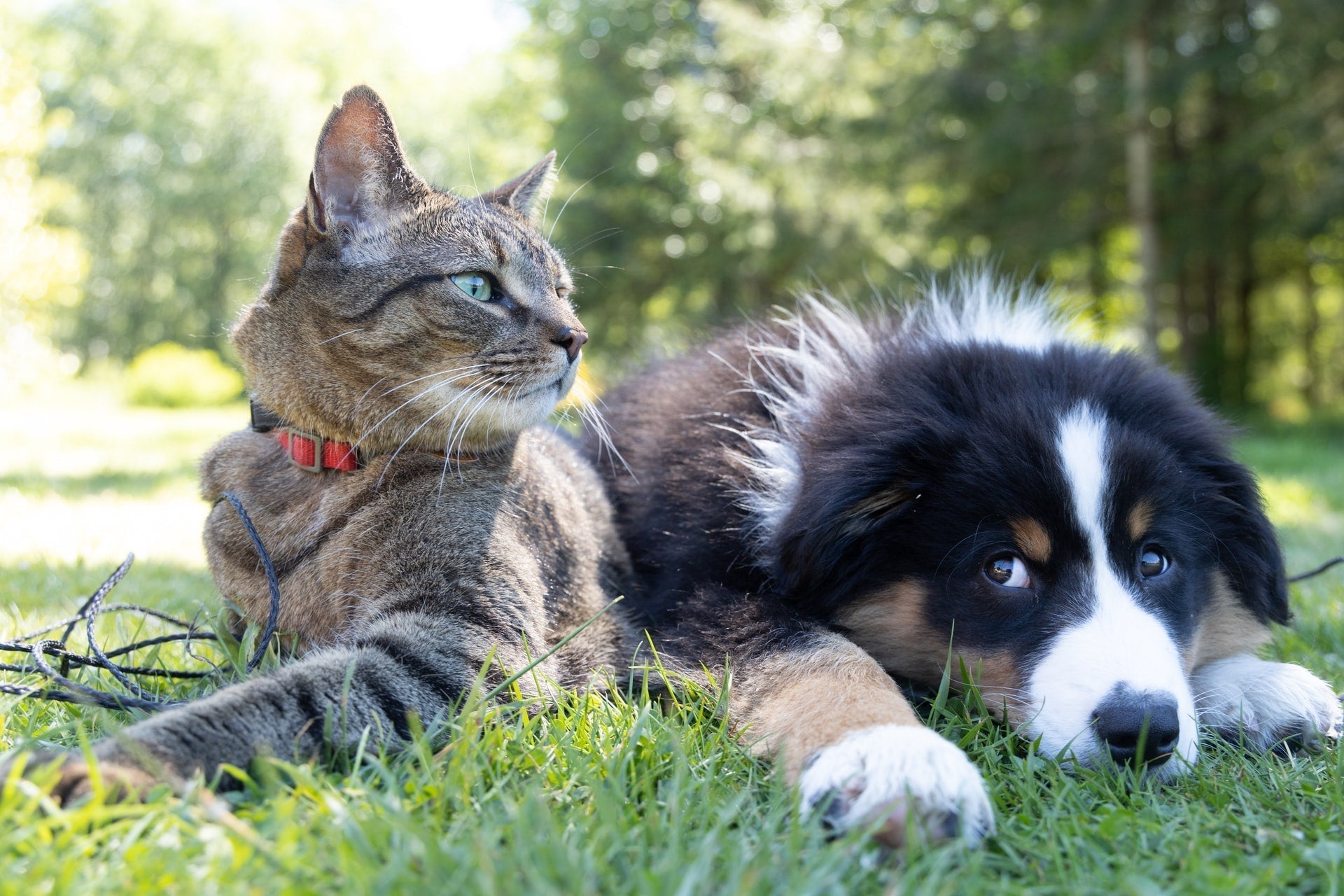November is National Pet Cancer Awareness Month in the US. This important annual event was created by Nationwide Pet Insurance and the Animal Cancer Foundation to help educate pet owners on protecting their pets against cancer.
According to the Animal Cancer Foundation:
"There are 65 million dogs and 32 million cats in the United States. Of these, roughly 6 million new cancer diagnoses are made in dogs and a similar number made in cats each year."
In fact, cancer is now the leading cause of death in both cats and dogs, and it is estimated that 50% of dogs and 33% of cats will die from the disease.
Clearly, cancer is a huge threat to the health and longevity of our pets. That's why it's so important that pet owners do everything they can to minimize their pet's risk of developing this devastating disease.
In this post, we'll highlight some of the scientific studies that indicate the anti-cancer properties of coconut oil. We'll also explore how coconut oil can be given as part of a ketogenic diet to help support your pet's immune system and protect them against cancer throughout their lifetime.

Coconut Oil and Cancer: What Does the Science Say?
Coconut oil is a powerful superfood that's been used for centuries to promote good health in humans and animals. And a growing body of scientific evidence suggests that it may have potent anti-cancer properties. In an article about coconut oil, the American Society for Nutrition says:
"Both research and clinical studies have shown that MCFA may be useful in treating and preventing diseases such as diabetes, osteoporosis, virus-related diseases (mononucleosis, hepatitis C, herpes, etc.), gallbladder disease, Crohn's disease, and cancer."
Several studies on humans and animals exhibit very promising results with regard to the anti-cancer properties of coconut oil. As a result, many holistic veterinarians have begun to include coconut oil as a regimen for the treatment of cancer in animals.
Not only does coconut aid in reducing the risk of cancer and other degenerative diseases it also aids in strengthening the patient’s immune system while undergoing radiation and chemotherapy treatments. To demonstrate these potent effects, let's take a look at a few of the scientific studies that have been conducted on coconut oil and cancer.
Lauric Acid and Colon Cancer Study
Researchers at the University of Adelaide studied the effects of lauric acid on colon cancer cells. Their findings show that lauric acid completely exterminated over 90% of colon cancer cells after just two days of treatment!
The study was conducted in vitro. This means that the results were observed in a test tube setting. However, the researchers believe that lauric acid could also eradicate colon cancer cells in clinical trials.
Coconut Oil and Breast Cancer Study
In a separate study, virgin coconut oil was shown to increase quality of life in patients undergoing chemotherapy treatment for breast cancer. To conduct the study, researchers divided a group of 60 patients with stage 3 or 4 breast cancer into two smaller groups. One group (the control) had no intervention, while the other group received supplementation with virgin coconut oil (VCO).
The results showed that the group of patients that took VCO while receiving chemotherapy treatment had much higher Quality of Life (QOL) scores than the group that received no supplementation. The researchers also found that: "the intervention group also had better scores for symptoms including fatigue, dyspnea, sleep difficulties, and loss of appetite compared to the control group."
Animal Studies on the Anti-Cancer Properties of Coconut Oil
Dr. Clara Lim-Sylianco, a scientist from UP Diliman, conducted several animal studies on coconut oil's anti-cancer effects during the 1980s and 1990s. In 1987, she published a review of 50 years of literature showing the anti-carcinogenic effects of dietary coconut oil.
The studies showed conclusively that coconut oil protected test animals against carcinogenic substances. And according to a study published in 2017, The Lauric Acid-Activated Signaling Prompts Apoptosis in Cancer Cells, "coconut oil has been shown to counteract the action of stimulatory agents in colon and mammary tumors in rats."
In his book, Coconut Therapy for Pets, Dr. Bruce Fife, C.N., N.D., discusses several scientific studies that point to coconut oil's anti-cancer properties. In one study, researchers examined the effect of dietary oils on breast cancer in laboratory animals. Dr. Fife explains:
"Researchers used a variety of different oils – olive oil, corn oil, canola oil, safflower oil, and coconut oil. The animals were fed an identical diet, except for the type of oil. Each animal was exposed to powerful carcinogenic chemicals to induce mammary cancer. All of the animals developed tumors, except those given coconut oil."
The Ketogenic Diet and Cancer
The ketogenic diet is a calorie-restricted low-carb, moderate protein, and high-fat diet. By replacing carbohydrates with dietary fat as the primary source of body fuel, the body is forced into a state of ketosis, where the cells utilize ketones for energy instead of glucose.
Ketosis has been shown to have anti-tumor effects. Unlike healthy body cells, many cancer cells are unable to utilize ketones because they do not have the metabolic flexibility to do so. Instead, they require large amounts of glucose to develop and proliferate.
Since the ketogenic diet reduces the levels of glucose in the blood, cancer cells simply cannot survive. A study carried out on mice to test the effect of the ketogenic diet on tumor growth, revealed a marked decline in the incidence of tumors. By starving the cancer cells and depriving them of energy, the ketogenic diet actually helps reverse cancer!
Coconut Oil and the Ketogenic Diets for Pets
Feeding your pet a ketogenic diet is a great way to protect against cancer, especially when paired with virgin coconut oil. Coconut oil is an important component of the ketogenic diet since it helps your pet get into ketosis more quickly.
The medium-chain triglycerides (MCTs) in coconut oil are quickly absorbed into the body and transported to the liver, where they are converted into ketones. Ketone levels rise as a result of this, allowing for greater energy availability while also speeding up fat breakdown in the body.
When ingested, coconut oil helps increase your pet's energy levels and induces rapid ketosis. It also helps increase good (HDL) cholesterol in the body and downplays the effects of bad (LDL) cholesterol. This ensures optimal heart health while on the ketogenic diet.
In addition, coconut oil contains a high level of lauric acid, which has potent antibacterial, antimicrobial, and antiviral effects. It also boosts the immune system, fights inflammation throughout the body, and provides significant antioxidant protection.
Wrapping Up
Combining a ketogenic diet with virgin coconut oil has been scientifically proven to help protect against cancer in pets. But it's important to plan your pet's diet carefully to ensure they receive all the nutrients they need. Need more information about putting together a ketogenic diet plan for your pet? Please refer to our handy guide.
In order to enjoy the health benefits of coconut oil, always remember to choose a high-quality, therapeutic-grade oil such as CocoTherapy Virgin Coconut Oil. Our oil is sourced from our USDA-certified organic family farm in the Philippines and carefully manufactured in our own facility. It contains the highest lauric acid content possible (53.28%) – the "super Ingredient" that boosts the immune system, protects against cancer, and supports your pet's overall health.
Want to find out more about how coconut oil can improve your pet's immune health? Check out our previous post, How Coconut Oil Can Help Boost Your Pet's Immune System.



